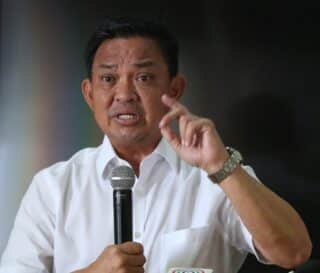Sen. Panfilo Lacson, the chair of the committee on public order that heard the testimony of retired policeman Arturo Lascañas on Monday, sought to credit Sen. Manny Pacquiao with the committee’s decision to end the inquiry after only one hearing. But was it in fact Pacquiao who delivered the final blow, or was the outcome a given, even before the first jabs were thrown?
Lacson, who has earned a reputation as a voice of reason during the various Senate investigations into extrajudicial killings, said the committee members agreed to end the inquiry because they did not see anything worth pursuing. Then he pointed to his colleague, the world-famous boxer. “It was Senator Pacquiao who delivered the coup de grâce,” Lacson said in Filipino. “Because he said, If we switch positions, you are the investigator and I am the one with two conflicting testimonies, what will your conclusion be? The answer of Lascañas was clear: He will have doubts.”
Lacson concluded: “So, he cannot blame all the senators for doubting, can he?”
This is a strange position to take, because doubt is not equivalent to certainty; shouldn’t an inquiry be conducted precisely to clarify doubts or turn them into certainty? If the senators are unsure which of the two conflicting testimonies to believe, why stop the inquiry? It doesn’t make sense—unless Lacson, Pacquiao, and other senators were already convinced that Lascañas couldn’t be trusted. If that were so, then their position would be dramatically different from the hypothetical case that Pacquiao proposed. They did not have doubts; they were certain that the man who confessed to having committed perjury, having killed over 200 people, having helped in the murder of his own two brothers, could not be believed.
Any person reasonably open to evidence would have seen the many possible ways the Senate committee could have followed up on the first hearing; it takes a certain amount of willpower to think that nothing, absolutely nothing, in what Lascañas said was worth pursuing.
But in fact Lacson already gave the game away, about two and a half hours into the hearing. After Sen. Grace Poe asked the representatives of the Philippine National Police if they were conducting any investigation related to the allegations, Lacson intervened. In a mix of English and Filipino, he offered an extended argument from practicality.
“Here’s a reality check. The better opportunity to investigate this was when Mayor [Duterte] was still not president. And Sen. Leila de Lima was then [Commission on Human Rights] chairperson. And even became [Department of Justice secretary]. Why was this investigation neglected? Now that he’s President, that’s when we think of investigating. This is more difficult. I’m just being realistic here. Senator Grace said, Why is the PNP not doing anything? That’s like talking to a wall. How will they investigate when the one implicated is the mayor who is now President and their commander in chief?”
He added a coda: “Ito yung katotohanan sa ating buhay.” This is the truth of our lives.
Set aside the common mistake of thinking that the national police force (defined expressly by the Constitution as a civilian organization) reports to a commander in chief. Ignore the erroneous assumption that De Lima, when she was still with the CHR, did not investigate killings associated with the so-called Davao Death Squad. Focus simply on Lacson’s main message: It is difficult, even impossible, to investigate a sitting president.
Is this true? If it were, then we should amend the Constitution to formally enshrine the culture of impunity. But history tells us otherwise. Holding the most powerful person in the country to account is in fact a difficult undertaking. But if necessary, it must be done. That is the truth. We are sorry to see the Senate shirk its responsibility.


